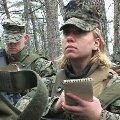26-year-old Lilly Alexei immigrated to the United States, along with her parents, when she was 13. The family settled in California, near a large military base, and that has a lot to do with where Alexei is now. Fascinated by the training exercises conducted at the base, she promised herself she would enlist in the Marines when she was old enough. When the time came, her parents objected. They only relented when Alexei said that she would instead become a police officer in a dangerous neighborhood. She has no regrets about her choice.
"This is what I always wanted to do. And I am glad that I have chosen this profession. I think this will be my career. I will stay at it for 20 years. I am very happy about that," she said. Alexei is one of the several hundred lieutenants, from many different backgrounds and nationalities, training now at Quantico. This is the only place in the country where officers of the U.S. Marine Corps are trained for war.
Colonel George W. Smith, commanding officer of Quantico's Basic Training School, says fitness and skills are only part of what it takes to be a Marine officer. Having a strong character is just as important, perhaps most important. "That character piece is the foundation. As we like to say, when you are put in very challenging environments, like the southern Helmand province of Afghanistan, or recently in western Iraq. Will your moral compass always point true north," he said. As part of their training, Marines at Quantico are placed in situations that closely resemble real war, particularly the military theater in Afghanistan.
These concrete structures are a simulation of an Afghan town. Insurgents have pushed out the civilian population and are hiding in the buildings. The Marines' mission is to root them out. This battle is not real war, of course. The Marines are shooting blanks. Their guns are equipped with a special device that emits laser beams each time a Marine pulls a trigger. The vests and helmets they are wearing have special sensors, which detect the direction of laser "rounds. " When a Marine gets hit by a laser beam, his weapon gets de-activated. He is considered "dead." "It angers me more than anything. We are not able to participate, we are not able to do anything to help the mission or anything like that," said the marine. Another feature of the simulation includes a checkpoint about 200 meters from the battlefield. Here, Marines learn how to search vehicles and people for possible explosives. The "role payers" in this exercise are actual Afghan refugees. In the war in Afghanistan, U.S. troops are not only fighting insurgents - they are expected to win over the hearts and minds of the local population. Bobby Booker, another Marine in the training program, says that cultural sensitivity is essential.
"As far as cultural sensitivities, we brought him back to the vehicle, not to disrespect him or his family. So that we don't have two Marines essentially standing over his wife while he was off. So, we brought him back closer to his vehicle, so that he could see his wife. So we did not offend him or his family at all," he said. The mission is accomplished when all insurgents are captured or killed. At the end of the operation, commanding officers debrief Marines. They analyze strategy and tactics, and talk about mistakes. The purpose of these exercises is to save lives in the future, when Marines are sent out on real missions. And Lilly Alexei is looking forward to that.
"I want to be in all the places where the military will send me. And of course I want to go to Afghanistan, now it's where all the action is," she said. For Lieutenant Lilly Alexei, the military exercises today may be vital practice for real battles in the future.

